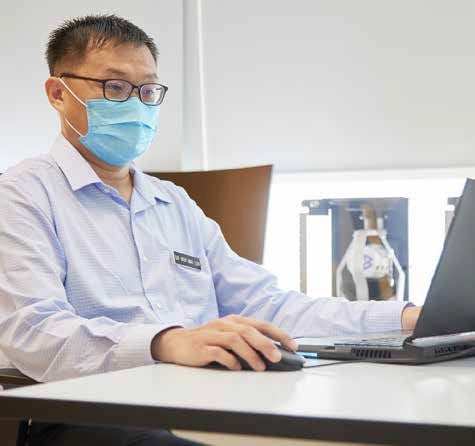
Dr Moy Wai Lun created a series of serious games, an innovative method of healthcare teaching and learning.
Like many people, Dr Moy Wai Lun played computer games during his secondary school days.
Today, the Consultant in the Internal Medicine Department at Sengkang General Hospital (SKH) and Clinical Assistant Professor with Duke-NUS Medical School has taken a step further to develop serious games that are designed to impart specific knowledge or skills in an interactive and engaging manner.
Serious games are used in many industries, including in defence, urban planning and engineering. In medical education, they are often used as a complementary pedagogical tool. “The concept of serious games is appealing because it offers something that traditional teaching methods do not,” said Dr Moy.
While conventional lectures impart a large amount of information to the learners, serious games promote higher levels of learning, such as knowledge application and data analysis.
“When I first conceived the idea of designing serious games, I spoke with junior doctors and many were interested in this new way of learning. Some of them have played serious games during their medical school years and they see the value of having serious games in postgraduate medical education,” Dr Moy said.
“We learn best from our own mistakes, but in healthcare this is not acceptable, as any mistake will cause harm to patients. Serious games bridge this gap,” he said.
Furthermore, serious games can be used to educate various cohorts of new doctors, without incurring high cost or extra resources. This method of learning also piques the interest of younger doctors, who are usually game-savvy and receptive to digital technologies.
From novice to creator
Dr Moy first learned about serious games when he attended SingHealth’s S3 conference in 2019, where experts from around the world shared their experiences in serious games development.
“It opened my eyes to the latest technologies in healthcare simulation and their potential uses in medical education to improve the delivery of patient care. I thought, ‘Wow, the future is already here, and I want to be part of it’!” he said.
That year, Dr Moy was awarded the Learning Technology Adoption Grant and has since collaborated with Dr Azman Johan, Senior Consultant, Respiratory Medicine, SKH; Dr Liou Wei Lun, Associate Consultant, Gastroenterology & Hepatology Department, Singapore General Hospital (SGH); Dr Mohammed Rizwan Amanullah, Consultant, Department of Cardiology, National Heart Centre Singapore; and Singapore-based technology company Playware Studios Pte Ltd to design and develop the games.
The team created three games, namely Can’t Catch a Breather, Thicker than Water and Rambunctious Rhythms, all of which are based on common acute medical scenarios. For example, in “Can’t Catch a Breather”, the game presents a patient who complains of acute breathlessness. The player is expected to examine the patient thoroughly to arrive at the correct diagnosis, offer immediate treatment at the level of his or her experience, and recognise the need to escalate to seniors for help to save the patient’s life.
Despite delays in the production timeline as a result of the COVID-19 pandemic, as well as challenges in communicating with the game developers who are not familiar with the medical industry, Dr Moy was determined to succeed as he hopes for more people to reap the benefits of these games — he spent much of his free time trying the games repeatedly to perfect them.
“The numerous virtual meetings that we had were worthwhile in the end,” he said. With a Masters in Medical Education, Dr Moy applied principles of adult learning when designing the games. These include building a safe environment for learners, allowing learners to identify their own learning needs through their mistakes, and removing performance pressure to prevent them from feeling discouraged and demotivated.
Learners can play the games as many times as they wish, as the scores are not used as assessment. After each session, guided feedback is given to consolidate the information gained and for the learners to better understand each medical scenario.
During the beta testing stage, 10 doctors each from SKH, SGH and Changi General Hospital were recruited to play the games. “The feedback was largely positive. Some of them were very appreciative of our initiative to enhance the learning of junior doctors, and many found the games fun and educational. We also received feedback on the technical aspects, which we have since improved,” said Dr Moy.
Plans are in the pipeline to roll out the games to all junior doctors in SKH. They will also progressively be made available to other SingHealth institutions. “This method of learning and teaching will be increasingly used in the future as an additional tool to reinforce certain medical knowledge and skills,” he added.
At home, Dr Moy enjoys building toys for his two children using recycled materials like cardboard boxes. The 38-year-old recently made a crocodile out of a plastic bottle, complete with a mouth that opens when the tail is pulled. He also got his eight-year-old daughter involved by asking her to paint the parts where colour papers could not cover, while his three-year-old son contributed by pasting stickers as decoration. “I believe that a child learns best through play. I often push myself to be more creative and think out of the box,” he said.
Get the latest updates about Singapore Health in your mailbox! Click here to subscribe.













 Get it on Google Play
Get it on Google Play